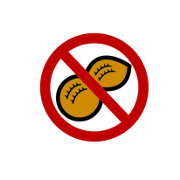
To many people, the word “allergy” means a runny nose or itchy skin. But for people with food allergies, the symptoms of an allergy attack can be sudden and potentially deadly.
Approximately 5 percent of children and 4 percent of adults in the United States have a food allergy. Adults who experience a late onset of a food allergy can find it particularly difficult to cope with new limits on what they can eat as foods they love and crave suddenly have the potential to cause life threatening symptoms.
Food allergies, like other kinds of allergies, are a response from the body’s immune system. The immune system exists to protect the body from diseases and toxins that are harmful. Skin and mucous membranes act as physical barriers in the immune system to keep germs out of the body, while white blood cells work in the blood to fight infections. The bone marrow and spleen produce specialized cells called antibodies that are designed to fight specific diseases. When the body identifies a foreign particle, a matching antibody is produced to fight it off the next time it enters the body.
The body is usually good at telling the difference between a germ such as a virus or bacteria that could harm the body from normal cells or substances such as foods or pollens that are not dangerous to the body. But when someone is allergic to a particular substance, whether it is pollen or a type of food, the immune system produces antibodies to match the particles it believes are harmful. Once the body has produced matching antibodies, the original substance is known as an allergen.
In the case of food allergies, the antibody produced is known as Immunoglobulin E or IgE. The next time the allergen is eaten the IgE antibodies rush to the food particles and attach themselves. This starts the body’s process to get rid of the allergen by releasing certain chemicals into the body, including histamine.
Histamine typically causes tissues to swell and can cause a variety of symptoms. When the allergen is pollen, the tissues most affected are in the sinuses, which can lead to hives or a runny nose. The medication most often used to fight these kinds of allergies are known as antihistamines because they are working to neutralize the effects of the chemical histamine.
In the case of food allergies, the allergic reaction can start in the mouth, move into the digestive tract and then enter the blood stream and travel throughout the body. This can lead to symptoms including hives, eczema (a painful scaly rash) diarrhea, nausea, vomiting, tingling in the mouth, and redness or swelling around the lips and face. The most extreme allergic reactions include anaphylaxis or anaphylactic shock which causes swelling in the airway that can stop breathing and a rapid drop in blood pressure. Anaphylaxis can be fatal if not treated immediately.
Once a substance becomes an allergen, the body will react every time the allergen is present, even in tiny amounts. Most food allergies begin early in life. But it is possible to develop food allergies as an adult. In some cases, an allergy to one substance may cause a reaction when you eat similar or related items. If you suspect you have a food allergy, see your doctor to find out precisely what you are allergic to and what you can do to protect your health.
Sources:
National Institute of Allergy and Infectious Diseases
Mayo Clinic
About.com: Food Allergies






Add a CommentComments
There are no comments yet. Be the first one and get the conversation started!